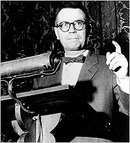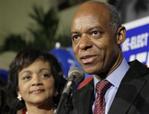A true Crisis is so enormous in the
psychological landscape of the nation that intellectuals frequently
make the mistake of analyzing the next crisis solely in terms of the
one that came before.
It’s especially easy to do this time
around because Iraq is so much like Vietnam. It’s an attempt to “win”
a land war in Asia where there is no effective opposition from those
Atrios lovingly calls “dirty fucking hippies.”
And it has failed.
So we have historians like Rick
Perlstein
(left) spending their time going over the last crisis period, from 1965-72,
thinking they can find the lessons that will keep things from going
wrong this time. What he may find is short-term fame and glory.
That’s what Richard Hofstadter (right) found
doing much the same thing in the run-up to that very crisis.
I have tackled Hofstadter before
here. Books
like The Age of Reform were seen as ground-breaking when I was a child, and were still
required reading for me in college. But what gave Hofstadter his
apparent depth was the fact that the previous two crises were
economic in nature.
The 1896 crisis which gave us Populism
and Rrogressivism, and the 1932 crisis that gave us the New Deal,
both involved economic questions like labor’s relationship with capital, and
business’ relationship with government. They resulted in a host of
reforms the Bush Administration has (ironically) spent much of its
domestic energy fighting to undo – economic regulation, antitrust,
labor law, a progressive income tax. His is truly a bridge to the
19th century.
And to nowhere. Because the next crisis
is not the last crisis any more than the last crisis was the one
before.
At the end of Hofstadter’s life he became completely absorbed in the
crisis before him, writing The Paranoid Style in American Politics,
which endorsed the coming Nixon Thesis of Conflict. The result of his
own vision, in other words, was to only see the next hill.
I think we can do more.
A clear
understanding of American history shows us merely that there are
cycles, that they have a cause in crises that, while predictable, are
nevertheless opaque, that each crisis is different, and that the
answer to dealing with each new crisis lies in new media and new
values, taught by new myths that emerge out of the previous antithesis.
The next crisis is so immense we
are doing everything possible to avoid looking at it. The harbinger,
the destruction of a major American city, and its descent into
barbarism, a “politics” that increasingly looks African in its
viciousness and tribalism , with calls for
reform unheard and only grasping for power understood – this is our
future. This is what we must be fighting to avoid.
Look this man in the eye and realize there is nothing he will not stoop to to retain power, and that the same thing is true for his white counterparts elsewhere in the zone of ruin.
It is past time we got off our
collective asses and started facing it. The next zone of ruin may be your city, your state, definitely your country. Consensus will be needed to face it, because narrow majorities only bring you fools like Ray Nagin and William Jefferson, Haley Barbour and Trent Lott.














“What he may find is short-term fame and glory.”
I’ll settle for that. Or a job. 🙂
You’ll love the long article I’m working on now for The New Republic on the misuses of the “McGovern” trope in American politics. Its argument is more like “your” argument than “my” argument.
“What he may find is short-term fame and glory.”
I’ll settle for that. Or a job. 🙂
You’ll love the long article I’m working on now for The New Republic on the misuses of the “McGovern” trope in American politics. Its argument is more like “your” argument than “my” argument.